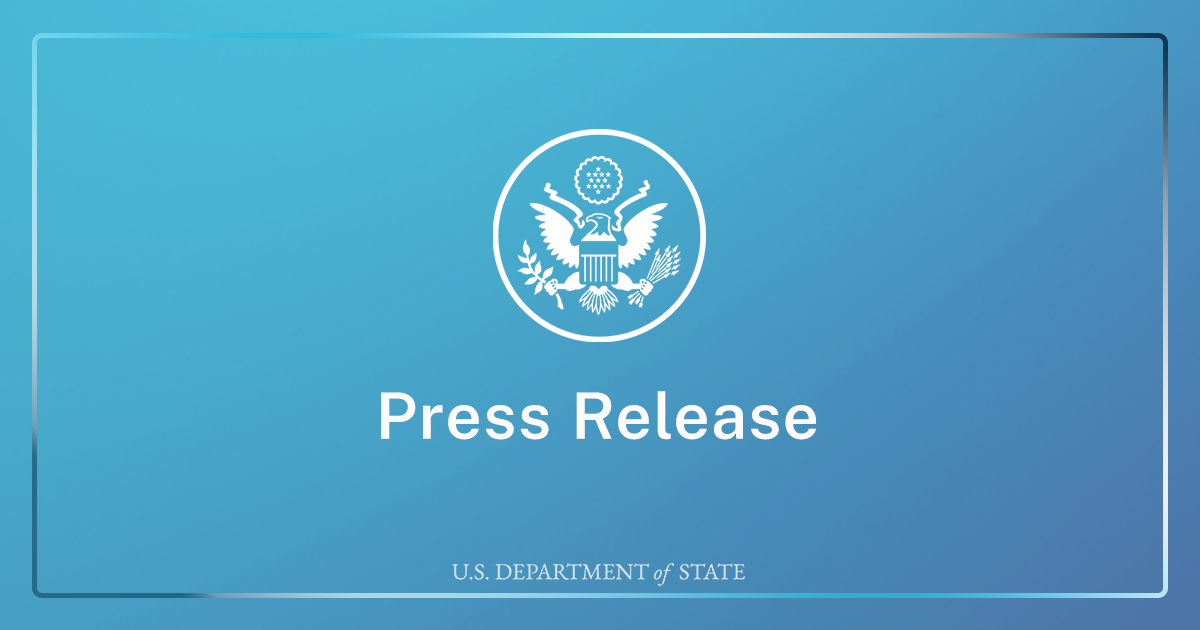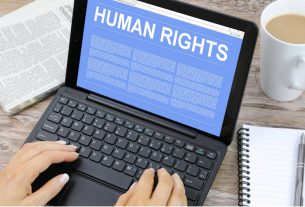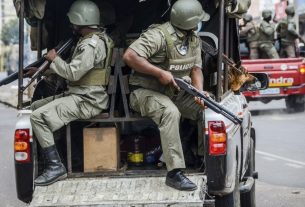Human Rights Day stands as a powerful reminder of our enduring commitment to dignity, freedom, and justice – values fundamental to the founding of our nation and to the world we envision. Today, we celebrate achievements in advancing human rights, while humbly recognizing the challenges that remain. We also showcase the courageous individuals who champion them daily: human rights defenders, anticorruption champions, journalists, and ordinary citizens.
This day calls for collective action and is an occasion to reflect on both our achievements and on the work that lies ahead in ensuring universal human rights for all. With the strong support of bipartisan champions in the U.S. Congress, the Department of State has invested more than $1.06 billion in foreign assistance to support human rights around the globe over the last four years. Select accomplishments over the last four years that represent real progress, but also inspire us to go further in pursuit of a fairer, more inclusive world, include:
Protecting Human Rights Defenders and Their Ability to Operate
Together with partners, we bolstered support to democratic reformers, giving activists, human rights defenders, and journalists the tools they need to press for governments to embrace democratic principles, reject corruption, and promote respect for human rights. We also broadened our engagement with civil society, empowering marginalized groups and other reform-minded leaders to have a voice in addressing these key challenges.
- Supporting Journalists, Civil Society, Workers, and Reform-Minded Leaders: The Department of State bolstered the work of activists and other reformers working on the front lines of protecting human rights by establishing new mechanisms to protect journalists and promote media freedom, such as the Journalism Protection Platform and joint efforts with the United Nations. We have provided direct financial support to almost 900 civil society organization (CSOs) in 86 countries facing threats through the Lifeline: Embattled CSOs Assistance Fund. Additionally, as part of the administration’s commitment to strengthen and improve respect for human rights and labor rights, the U.S. released the second National Action Plan on Responsible Business Conduct, and established a Federal Advisory Committee to enable experts to advise the United States on pressing issues regarding responsible business conduct. And we worked with partners to equip young leaders with essential skills through initiatives like the Community of Democracies’ Youth Democracy Network, and the Indigenous Youth Leadership Coalition.
- Advocating for the Release of Unjustly Detained Individuals Globally: We raised international awareness of the plight of political prisoners and their families and advocated for the release of all unjustly detained individuals worldwide. Notable accomplishments include facilitating the release of 357 Nicaraguan political prisoners, including human rights defenders and Catholic laypeople, to Guatemala. Additionally, the Department worked with international partners to secure the release of 16 unjustly detained prisoners held by the Russian government, including four Americans, in the largest prisoner swap since the Cold War. In a number of other countries around the world, our tough diplomacy helped secure the release of additional civil society leaders and ordinary citizens unjustly detained for exercising their fundamental freedoms. And to support this work, we unveiled additional tools to promote accountability for individuals engaged in wrongful, abusive, or unjust detentions of U.S. citizens or foreign nationals.
- Promoting Civilian Protection: We elevated human rights considerations in security decisions and partnerships, including U.S. arms transfers and security trainings, to higher standards through various efforts. These include the Civilian Harm Incident Response Guidance, a new process to assess and respond to civilian harm incidents by U.S. security partners involving U.S.-provided defense articles. We also expanded the reach of the Elie Wiesel Genocide and Atrocity Prevention Act by hosting trainings for partner governments on addressing atrocity risk and implementing women, peace, and security principles in real time. We launched the Dignity in Documentation Initiative to support integrated and multi-disciplinary justice for survivors of conflict-related sexual violence by investigating and documenting cases and promoting accountability for crimes punishable under international law. The Department also improved implementation of the Leahy Law, through proactive reviews of potential violations plus a yearly increase in the number of foreign security force units vetted. We also established a U.S. Conventional Arms Transfer Policy that significantly elevates human rights and civilian protection considerations in U.S. arms transfer decisions.
Addressing Transnational and Emerging Threats
New and often cross-border threats continue to evolve and pose serious risks not only to U.S. national security and the lives of Americans, but often lead to human rights abuses. As these threats have continued to evolve, so too has the United States’ response as we have bolstered our global partnerships to respond and set the rules of the road to safeguard against them.
- Combating Transnational Repression: The United States worked with multilateral partners to raise awareness, counter the threat, and promote accountability for acts of transnational repression (TNR) – actions by authoritarian regimes to silence critics and control activism abroad. We engaged countries globally to call attention to this threat to human rights, the rule of law, and national sovereignty and to condemn acts of TNR targeting individuals around the world. Through the new U.S. led working group on TNR under the G7 Rapid Response Mechanism, we raise international awareness of the threat TNR poses, affirm our shared commitment to countering the threat, and share best practices and lessons learned. The United States delivered a statement on behalf of more than 45 countries at the 56th Session of the Human Rights Council to address the urgent and growing threat of TNR. And to hold perpetrators accountable, we announced the Khashoggi Ban, a policy restricting those engaged in TNR from obtaining U.S. visas and traveling to the United States.
- Fighting Corruption: We elevated corruption as a core threat to democracy and human rights, enhancing our partners’ capacity – including civil society and the media – to promote accountability for corrupt actors.
- Advancing Technology for Democracy: We strengthened U.S. leadership on the intersection of democracy and technology, ensuring that new and emerging technologies promote respect for human rights and democratic values. By signing the Council of Europe’s Framework Convention on AI and Human Rights, Democracy, and the Rule of Law, the globe’s first ever multilateral treaty on artificial intelligence (AI), we underscored that respect for human rights is the foundation of safe, secure, and trustworthy AI. We implemented more than $12 million for programs utilizing AI as a tool to advance democracy, promote human rights and labor rights, and foster justice and accountability. Additionally, the United States led the development of a groundbreaking resolution on safe, secure, and trustworthy AI systems for sustainable development in the UN General Assembly and developed a Joint Statement on Responsible Government Practices for AI Technologies that was committed to by the 41 countries of the Freedom Online Coalition. In support of a safer online environment, we outlined best practices and actions that online platforms can take to implement robust support for human rights defenders under threat through the Guidance for Online Platforms on Protecting Human Rights Defenders Online. And the Department has invested more than $13 million to prevent and respond to technology-facilitated gender-based violence and counter its chilling effects on inclusive democratic participation. The United States also implemented a suite of actions to address the growing misuse and abuse of commercial spyware, threatening human rights defenders, journalists, and others, spearheaded by launching the Joint Statement on Efforts to Counter the Proliferation and Misuse of Commercial Spyware, the first multilateral initiative to take collective action to address the threat. The Joint Statement has doubled in size since its inception, now with 22 total members, including new addition, Latvia.
Promoting Accountability for Authoritarian Actors
We used a range of sanctions and accountability tools to address human rights violations worldwide to promote accountability and to deter future abuses, leveraging existing accountability mechanisms and creating new ones to promote accountability for those violating and abusing human rights.
- Human rights sanctions: We publicly designated over 80 officials for their involvement in gross violations of human rights, and also sanctioned over 240 individuals and entities for serious human rights abuses under the Global Magnitsky Sanctions Program, including the largest set of designations the United States has ever made against perpetrators of gender-based violence.
- Visa restrictions: We have imposed visa restrictions on over 8,000 individuals since 2021 for undermining democracy, repressing marginalized groups, transnational repression, and other activity adverse to U.S. interests, including additional actions announced yesterday.
- Business advisories: We created business advisories to highlight the legal, financial, and reputational risks posed to businesses, including those operating in Russia and Russia-occupied territories of Ukraine, Uganda, and Hong Kong.
- Spyware: We used a number of innovative tools to promote accountability for individuals and companies that misuse or enable the misuse of commercial spyware, including through visa restrictions, additions to the Commerce Department’s Entity List, and imposition by the Treasury Department of economic sanctions.
- Forced Labor: We countered forced labor through implementation of the Uyghur Forced Labor Prevention Act, resulting in companies conducting due diligence measures to ensure compliance with U.S. laws by tracing their supply chains for potential connections to forced labor.
Partnering with Other Global Leaders in the Protection of Human Rights
We did not accomplish any of this alone, but rather deepened our connections with our partners and allies to advance a common vision and unified front in the face of authoritarianism and to counter transnational threats to democracy and human rights.
- Restoring U.S. Leadership in UN Bodies: The United States rejoined and actively participated in UN bodies to push back against authoritarian influence, advocate for human rights, promote accountability for violations and abuses, and set human rights standards. We demonstrated U.S. leadership by electing Americans to lead the International Telecommunication Union, International Organization for Migration, and the World Food Programme. We rejoined the UN Human Rights Council, and steadfast advocacy over our three-year term produced concrete progress on human rights. We worked with other governments to highlight human rights abuses, elevate human rights defenders and civil society, and call for accountability, supporting new reporting and investigative mandates on human rights abuses and violations in Afghanistan, Iran, Russia, Ukraine, and Sudan; UN accountability mechanisms on Burma, the DPRK, Syria, Nicaragua, and Venezuela; and the first-ever consideration by the Human Rights Council of domestic human rights concerns in Russia.
- Strengthening U.S. Leadership to Rally Partners: We reaffirmed our commitment to global leadership and promoting and championing democracy and human rights on the world stage. In the clearest example of this, we rallied partners to build an unprecedented coalition to support Ukraine while imposing costs on Russia for its illegal war and prolific human rights abuses. We launched the Summit for Democracy, and through that process brought together hundreds of governments, civil society, and private sector leaders committed to championing democracy around the world. The last three Summits have demonstrated the power of collective action and global leadership to sustain momentum toward democratic resilience – to renew democracy, protect human rights, and advance the fight against corruption.
- Engaging Regional Bodies to Promote Human Rights: We worked closely with regional initiatives to support local capacity for protecting human rights and fundamental freedoms and reinforcing regional efforts to create stable, just, and inclusive societies. For example, we engaged with the Organization for Security and Cooperation in Europe (OSCE to stand up to Russia’s obstructionism, working with like-minded governments to: invoke OSCE’s Moscow and Vienna Mechanisms to focus international attention on intensifying repression within Belarus and Russia and Russia’s abuses and atrocities in Ukraine; ensure the annual holding of the OSCE region’s highest-profile human rights gathering of governments and human rights defenders in Warsaw; and supported the work of OSCE’s Support Program for Ukraine and field missions in the Western Balkans and Central Asia to advance rule of law, media freedom, respect for fundamental freedoms, and women’s empowerment. We launched the first ever Association of Southeast Asian Nations-U.S. High Level Dialogue on the Rights of Persons with Disabilities, building momentum to elevate disability rights and integrate persons with disabilities across ASEAN mechanisms. We led the Organization of American States’ LGBTI+ Core Group through a robust agenda focused on ending so-called conversion therapy practices and improving relationships between law enforcement and LGBTQI+ persons. At the 2022 Summit of the Americas, we supported the elevation of civil society’s engagement with regional leaders on issues of hemispheric concern.
For further information, please contact [email protected].



